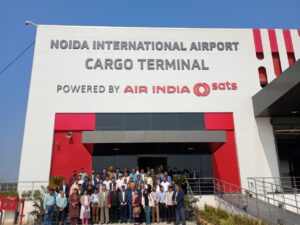Alpana Chaturvedi, CEO, My Logistics Gurukul, shares her views on the imperative of robust support systems and interdisciplinary collaboration in logistics education. She emphasizes sustainability integration, technology adoption, and industry-aligned curriculum adaptation for future-ready professionals.

Anticipating Logistics as favored post-college career choice like IT, Engineering, Medicine
Alpana Chaturvedi stresses vital resources for aspiring logistics professionals. One looks forward to the day when Logistics like IT, Engineering, Medical, etc., becomes a favoured career choice after college. Tailored programs, mentorship, and internships provide hands-on experience. NSDC-endorsed apprenticeships attract students. Placement support, industry alliances, and career guidance enhance readiness. Engaging students in industry events facilitated by PHD, FICCI, and CII offers exposure to evolving industry trends and networking opportunities.
Sustainable synergy
Educational programs are adapting to address sustainability concerns, preparing future leaders for responsible supply chain management. These programs integrate sustainability topics into coursework, offer specialized courses, promote research, and organize sustainability-focused events. Such initiatives aim to instill environmental consciousness and ethical practices in aspiring logistics professionals.
Interdisciplinary collaboration is crucial to navigating the increasingly complex logistics landscape. Automation and modern warehouse practices require expertise in engineering and IT, while effective team management necessitates skills in finance and HR. The integration of pharmaceuticals and cold chain logistics further highlights the need for diverse expertise. Collaborating across disciplines fosters innovation, problem-solving, and creativity, leading to more effective solutions to industry challenges.
Learning innovation
The logistics industry stands at the threshold of a technological revolution, poised to redefine the educational landscape. As conventional methods give way to emerging technologies, the sector witnesses a transformative shift in logistics education. Artificial intelligence, blockchain, and the Internet of Things emerge as catalysts, offering innovative learning experiences and tools. Machine learning (ML) and virtual reality (VR) technologies simulate diverse logistics environments, providing students with immersive, hands-on learning opportunities, particularly in warehousing operations. This paradigm shift necessitates a blended approach, integrating classroom methodologies with cutting-edge technology and self-learning tools. Such a multifaceted strategy ensures an enriching educational experience, equipping students with the skills essential for success in the dynamic logistics industry.
Diverse recruitment
Educational institutions are actively diversifying their recruitment strategies to attract a broader spectrum of students to careers in cargo and logistics. These initiatives include targeted outreach programs aimed at underrepresented groups, forging partnerships with high schools and community colleges, and highlighting the diverse array of career opportunities within the industry.
Collaboration between institutes and industry stakeholders plays a pivotal role in branding logistics as an attractive career path. Efforts to promote inclusivity also extend to addressing gender disparities, with a focus on highlighting opportunities for women in a traditionally male-dominated field. The National Education Policy’s emphasis on vocational education further underscores the importance of nurturing talent for the logistics sector from an early stage. Moreover, industry and academia collaborate to ensure curriculum alignment with evolving industry demands. This involves conducting industry surveys, seeking guidance from experts, and incorporating practical learning modules. Industrial visits provide students with firsthand exposure to logistics operations, facilitated through collaboration with key stakeholders such as cargo terminal operators. These concerted efforts aim to cultivate a diverse and skilled workforce equipped to meet the evolving needs of the logistics industry.











